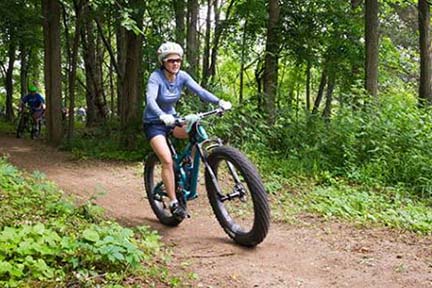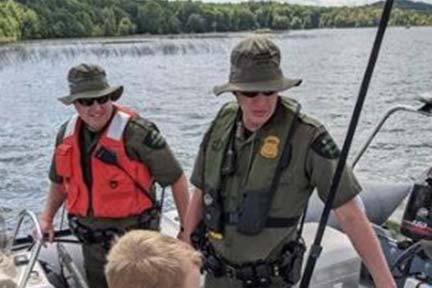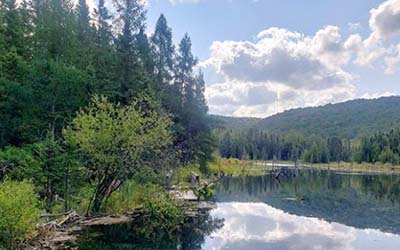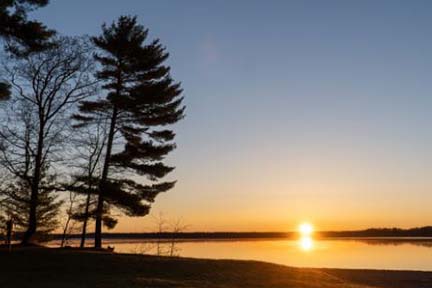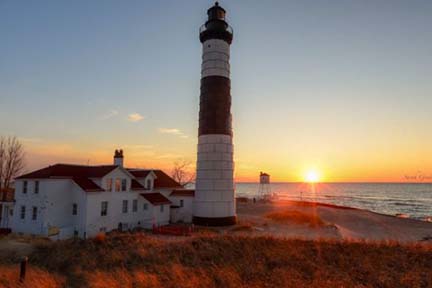Accessing Michigan’s outdoor recreation
DNR champions numerous efforts to help make opportunities available to all
By HEATHER JOHNSON DUROCHER
Trails and resources writer, Parks and Recreation Division
Michigan Department of Natural Resources
A wide smile breaks across Jamie Spore’s face as she sits at a shaded picnic table and the conversation turns to Michigan’s abundant fresh water – to one specific Great Lake, in fact, which captured her heart many years ago.
“I’ve always loved Lake Michigan,” the 42-year-old says, her grin reaching the corners of her eyes. “I’ve lived here my whole life, and I floated in the lake when I was a little girl.”
“Here” is the western Lower Peninsula, in Ludington, and Spore can’t help but get emotional speaking of her childhood near Lake Michigan and spending time at the beach with her family.
These are cherished memories, reminders of what has always brought so much meaning to her life: having the opportunity, as someone who uses a wheelchair and lives with spina bifida, to soak up the sun and immerse her body in the cool water.
 As a child, her parents helped her enjoy the lake; today she can do this thanks to a beach access chair, which is a lightweight, all-terrain wheelchair that can also go into the water. As a child, her parents helped her enjoy the lake; today she can do this thanks to a beach access chair, which is a lightweight, all-terrain wheelchair that can also go into the water.
Spore’s emotions around spending time along the shoreline and exploring nearby trails have only heightened in recent time, as her beloved Ludington State Park continues to grow its accessible outdoor recreation amenities.
“I’ve seen more of the state park in the past couple of years than I have in the past 40 years,” she says while swiping at her eyes and dabbing away tears. “Being able to get into Lake Michigan, to have the opportunity to do that when you have thought you couldn’t, is indescribable. It’s amazing. It’s unbelievable.”
Making the outdoors inclusive
The Michigan Department of Natural Resources’ efforts to make the state’s natural resources available for people of all abilities to enjoy are a top priority, with a wide variety of accessible recreation opportunities continuing to grow at state parks, campgrounds, boating access sites, state game areas, trails and more.
“Ensuring accessibility on Michigan’s public lands is not just providing access to nature – it’s affirming that everyone, regardless of ability, deserves the opportunity to experience the beauty and peace of our great outdoors,” said Michelle O’Kelly, fund and resource development specialist for the DNR’s Parks and Recreation Division.
From accessible walkways to the waterfront, user-friendly kayak launches, color blind scenic viewers at overlooks and motorized track chairs for trail exploration to accessible accommodations including mini cabins, camper cabins, lodges and yurts, an increasing number of Michigan state parks offer inclusive ways for visitors to enjoy the outdoors.
More than 30 state parks and recreation areas provide accessible fishing piers. Looking for hunting spots with accessible features? Several locations, including Sleepy Hollow State Park, Pinckney Recreation Area, Rifle River Recreation Area and Holly Recreation Area, feature accessible hunting blinds (see the complete list of locations on the DNR’s accessible hunting webpage). |
 Several state game areas also have accessible hunting features and special hunting opportunities – elk and black bear license opportunities for hunters with advanced illness and an Independence Hunt for hunters with qualifying disabilities, to name a couple – are available as well. Several state game areas also have accessible hunting features and special hunting opportunities – elk and black bear license opportunities for hunters with advanced illness and an Independence Hunt for hunters with qualifying disabilities, to name a couple – are available as well.
DNR shooting ranges also offer a fun, safe shooting environment with customer-friendly and highly trained employees. They feature accessible amenities like handgun, rifle, shotgun and archery ranges and restroom facilities.
The DNR also hosts accessibility-focused events, such as sensory-friendly days at the Outdoor Adventure Center in Detroit.
“We are proud of our strong focus on making Michigan’s natural resources available for people of all ability to enjoy,” said Ron Olson, chief of the DNR’s Parks and Recreation Division. “We are committed to promoting universal access to the tremendous outdoor recreation opportunities Michigan has to offer to the public. We appreciate all of our valuable partners and friends groups that have joined the effort to have continuous improvement to enhance access.”
Colorblind viewers: ‘Wow!’
Imagine seeing fall’s vivid colors, on full display at a scenic state park, for the very first time. This is the experience of some visitors to state parks that feature EnChroma colorblind viewers.
Mike Knack, park manager at Porcupine Mountains Wilderness State Park in the Upper Peninsula, first heard of EnChroma colorblind viewers through his counterparts with the Tennessee state parks system.
“I knew we needed them – the Porkies is such a special place, and we want everyone to be able to enjoy it,” said Knack, who learned that 12% of the population has some form of colorblindness. “This is one more way we can offer accessibility in Michigan’s state parks and these visitors can experience the views of the park in a similar way.”
The Porkies is home to specially adapted EnChroma lenses at the Lake of the Clouds Scenic Overlook (the most photographed feature in the park), the 50-foot Summit Peak Observation Tower (the highest point in the park at nearly 2,000 feet above sea level; look for views of the Apostle Islands to the northwest and Isle Royale to the northeast on clear days!) and Nawadaha Falls on the Presque Isle River, located on the western edge of the park. |
 Visitors with colorblindness who experience these special viewfinders are in awe about what they’re able to see in an entirely new way, Knack said. Visitors with colorblindness who experience these special viewfinders are in awe about what they’re able to see in an entirely new way, Knack said.
“The typical first reaction is 30 seconds of looking through the viewer, then outside of the viewer and back in the viewer before looking back out again to compare and contrast what they are seeing,” he said. “This is often followed by another 30 seconds of silence and then finally a ‘Wow!’ That reaction is exactly why these viewers are so important. The majority of us take for granted the vibrant green trees we see in the summer and the yellows, oranges and reds we see in the fall.”
In addition to Porcupine Mountains Wilderness State Park, EnChroma lenses are available south of the Mackinac Bridge at Waterloo State Recreation Area in Jackson County, Ludington State Park on Lake Michigan and William G. Milliken State Park and Harbor in Detroit, where these viewers, courtesy of the Detroit River International Wildlife Refuge and EnChroma, enable visitors to view the river and our neighbors in Canada. Highland Recreation Area in Oakland County is another location that soon will be home to these special viewers.
The DNR is raising funds to install EnChroma lenses at nine additional locations around the state. These locations include Rifle River and Fort Custer recreation areas, Grand Traverse Lighthouse at Leelanau State Park, Waterloo Recreation Area, and Port Crescent, Fisherman’s Island, Brimley, Muskegon and Maybury state parks. To contribute to this campaign please visit the colorblind scenic viewer donation page.
Trailblazing track chair program
With close to 20 locations around the state now having track chairs available for use at no cost – and additional locations soon to receive these off-road, electronic chairs that can easily handle trails, snow, sand and even up to 8 inches of water – Michigan now offers more track chairs for public use than any other state parks and recreation system. |
 Late last year, the DNR surpassed its funding goal of $400,000 to purchase track chairs for a growing number of state parks and trails. More than 300 donors have raised $495,036 over the past five years to purchase track chairs, which allow users to explore areas of the parks that traditional wheelchairs might not reach. Late last year, the DNR surpassed its funding goal of $400,000 to purchase track chairs for a growing number of state parks and trails. More than 300 donors have raised $495,036 over the past five years to purchase track chairs, which allow users to explore areas of the parks that traditional wheelchairs might not reach.
Some 19 locations around the state now have track chairs available for use at no cost, with 13 additional locations soon to receive chairs, thanks to a multiyear fundraising campaign. The cost of one track chair is about $16,000.
Support has come from DNR partner organizations, including Kali’s Cure for Paralysis Foundation, Safari Club International, Family Hope Foundation and Friends of Ludington and Grand Haven state parks and Island Lake Recreation Area. Campers and boaters from across the state who chose to contribute an additional $2 when making their park and harbor reservations also helped the DNR reach its track chair fundraising goal.
“It’s so inspiring to see the program grow and to witness more people taking this simple yet powerful action that makes their favorite places more accessible to everyone,” O’Kelly said.
Check out a track chair in action in this short video.
The hope is to continue to add to the state’s fleet of track chairs over time. Anyone wishing to contribute to this anticipated program expansion – or other efforts to enhance state parks – can make a donation by visiting the DNR state parks giving page.
“This effort is just one component of the DNR’s departmentwide strategy to make outdoor recreation – beaches, campgrounds, fishing, hunting, trails and more – accessible to even more people,” O’Kelly said. “I’m really proud of Michigan for being on the forefront of recreation for all.”
Accessible, experiential field trips
The DNR’s new Nature Awaits program, an environmental education experience that’s free to fourth grade classrooms, is yet another avenue for accessible outdoor recreation. |
 “Ten percent of our field trips requested some kind of special need accommodation this past spring,” said Aileen Kemme, DNR Nature Awaits communications coordinator. “Track chairs for wheelchair users and students on crutches was our top request.” “Ten percent of our field trips requested some kind of special need accommodation this past spring,” said Aileen Kemme, DNR Nature Awaits communications coordinator. “Track chairs for wheelchair users and students on crutches was our top request.”
Other ways this program has assisted students include having interpreters and educators incorporate audio systems throughout a hike, making accommodations for a student accompanied by a full-time nurse and carrying emergency oxygen, and using an iPad to communicate with students who are not able to express themselves verbally.
During these 90-minute field trips, students explore state parks and learn about things such as how humans impact natural landscapes, the native and invasive plants and animals of a park and how Michigan’s state parks belong to everyone in the state.
“This program is designed to really open up their senses to the outside world,” said Sophie Riley, Grand Region Nature Awaits interpreter. “We start with some really great basics, using all five senses out in nature and connecting with nature – we’re making those social and emotional connections to nature. We’re learning about taking care of our natural world, now and in the future.”
One field trip experience included about a dozen students, all of whom were on the autism spectrum. Sensory-friendly activities were important to this group, Riley said.
“We have these flat, circular and colorful silicon barriers they sit on, so they’re not sitting directly on the ground,” she said. “We have them close their eyes and listen to the wind, the birds, and we have their hands feel the sand and the rocks.”
The experience got the students talking, Riley said.
“I had kiddos who talked more in that one day than they had in one week, their parents said,” she said. “It’s been a really amazing experience. We do everything we can to adapt, finding ways to slow it down in one part or make it more detailed in others – we really adapt the routine to each group, which is the most important thing.”
Friends at Ludington
Back at Ludington State Park, the park’s friends group continues to raise funds and find ways to add to its numerous accessible park amenities, including an EnChroma viewfinder and a playground and kayak launch at Hamlin Lake in addition to floating wheelchairs, track chairs and accessible pathways.
“The friends group is focused on having Ludington State Park be the most accessible park in the state park system,” says Patrick O’Hare of Friends of Ludington State Park. “That’s really what we’re doing.”
Spore said these efforts have had an enormous impact on her life.
“I seriously cannot thank them enough for all that they’ve done for the state park – not only what they have done for the state park, but honestly for having such an interest and love for accessibility and inclusion, because not everybody feels that way – and I have accepted that over the years,” she said. “To be able to use that floating wheelchair, to soak my feet in Lake Michigan, there is no words for how that feels. And the irony is that I can’t feel my feet. I am paralyzed from my belly button down. I’ve been a paraplegic my entire life, so I can’t feel my feet in the lake, but I can put my hands in and feel how cold it is and to have the opportunity to do that … it’s amazing.”
Equally as incredible, she added, is sharing these experiences with her loved ones, whether that means venturing with her family to Big Sable Point Lighthouse and out on the trails using a track chair or taking a refreshing dip in Lake Michigan.
“I’m a maritime nerd, a boat nerd, a lighthouse nerd,” she says, her wide smile returning. “It’s a huge deal for my family and friends … I am grateful beyond words.”
Learn more about the DNR’s accessible recreation efforts at Michigan.gov/DNRAccessibility. |
Check out previous Showcasing the DNR stories in our archive at Michigan.gov/DNRStories. To subscribe to upcoming Showcasing articles, sign up for free email delivery at Michigan.gov/DNREmail.
Note to editors: Contact: John Pepin, Showcasing the DNR series editor, 906-226-1352. Accompanying photos and a text-only version of this story are available below for download. Caption information follows. Credit Michigan Department of Natural Resources, unless otherwise noted.
Text-only version of this story.
Kayak: Leo Hesting prepares to launch his kayak up on the return chute of the accessible kayak/canoe launch Friends of Ludington State Park donated to the park. (Photo courtesy of Steve Begnoche, Friends of Ludington State Park).
Lake: Jamie Spore enjoys an opportunity to put her feet into Lake Michigan, thanks to amenities at Ludington State Park that help increase accessibility for park visitors. (Photo courtesy of Jamie Spore).
Nature: Interpreter Sophie Riley engages students in Nature Awaits activities at Hoffmaster State Park in Muskegon County.
Playground: Emerson Grinnell plays on the accessible playground Friends of Ludington State Park donated to the park. (Photo courtesy of Steve Begnoche, Friends of Ludington State Park).
Spore: Jamie Spore gazes out at Lake Michigan from the beach at Big Sable Point Lighthouse at Ludington State Park. The two track chairs donated by Friends of Ludington State Park to the park are often used by people wanting to get to the lighthouse, a trek of almost 2 miles that many couldn’t make until the chairs became available. (Photo courtesy of Steve Begnoche, Friends of Ludington State Park).
Viewer: An Enchroma colorblind viewer is shown from Ludington State Park. (Photo courtesy of Steve Begnoche, Friends of Ludington State Park).
Walkway: Julie Wernette pushes Jamie Spore down the accessible walkway at the Lake Michigan beach house at Ludington State Park. The walkway was a joint effort of the park and Friends of Ludington State Park. The floating beach chair was one of several beach accessibility chairs and walkers the friends group donated to allow better access. (Photo courtesy of Steve Begnoche, Friends of Ludington State Park). |
